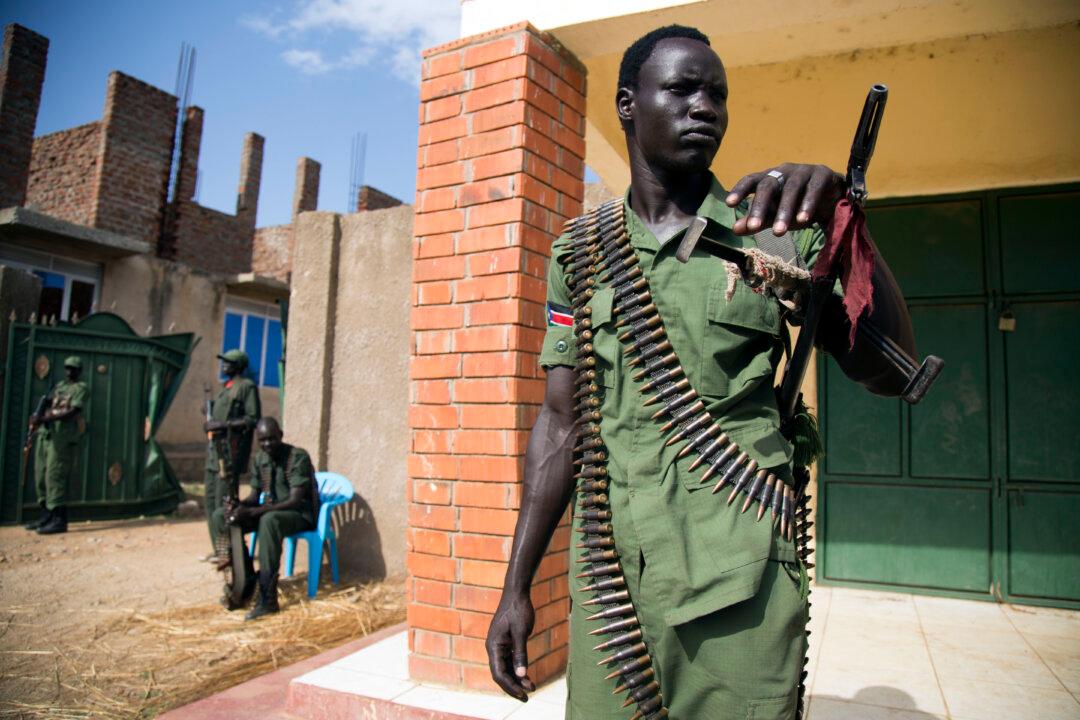NAIROBI, Kenya—Soldiers have brought scores of bodies to a hospital in South Sudan’s capital after gunfire erupted throughout Juba on Friday evening, a doctor at the hospital said Saturday, as panicked residents worried of a return to civil war.
The doctor said a total count of the dead was not available because soldiers were not allowing doctors to examine the bodies, but he said the morgue was full at Juba Teaching Hospital. Another doctor there estimated 110 bodies, both soldiers and civilians.
It was the first word of deaths from Friday’s violence. The majority of the bodies were of soldiers, the first doctor said. Both insisted on speaking on condition of anonymity because of fears for their safety.
The gunfire began outside the presidential compound as President Salva Kiir was meeting with first vice president and former rebel leader Riek Machar and soon spread through the city. The former rivals issued a joint call for calm.
Residents reported quieter streets Saturday, on South Sudan’s fifth anniversary of independence. Many people remained indoors.
“Government leaders are attempting to restore calm. However, these actions are not yet successful. Large numbers of troops remain on the streets,” the U.S. Embassy in Juba said on its Facebook page.
Some international groups like the International Monetary Fund were evacuating their staff from the country. All foreign and local IMF staff and their families were evacuated as the office relocated temporarily to Nairobi, Kenya, said Philippe Egoume Bossogo, head of the IMF office in South Sudan.
Gunfire continued into Friday night outside a U.N. base in Juba sheltering more than 25,000 people. Budbud Chol, who oversees security at a clinic inside the base, said Saturday they had received about 40 people wounded by gunfire, all but three of them men.
“They are still coming up to now. All of them are gunshot,” Chol said.
Chol said many of the wounded were hit in crossfire outside the U.N. base. One woman was hit by a stray bullet inside the base, Chol said.
One death inside the U.N. base was reported, spokeswoman Shantal Persaud said, and at least 1,000 civilians had crowded into the U.N. staff housing and office areas seeking shelter.
In a statement later Saturday, the mission said it was “outraged” by the heavy fighting near the U.N. compound and that “several rounds” had hit buildings inside it.
Most of the diplomatic corps in Juba took shelter at the European Union compound Friday night, while the U.N. head of mission was at the U.S. Embassy, Persaud said. Armored escorts meant to extract her from the embassy on Saturday were prevented by checkpoints from bringing her back to a U.N. base, she said.
South Sudan’s defense minister, Kuol Manyang Juuk, called the situation on Saturday relatively calm and spoke to the U.N. mission about running patrols in the city’s streets “so that they see the security situation,” the U.N. mission tweeted.
The latest violence began Thursday night with shooting between opposing army factions who are supposed to be carrying out joint patrols under a fragile peace deal reached last year.
That shooting, which killed five soldiers, was similar to the skirmish between soldiers in Juba in December 2013 that led to the civil war in which tens of thousands of people were killed.





